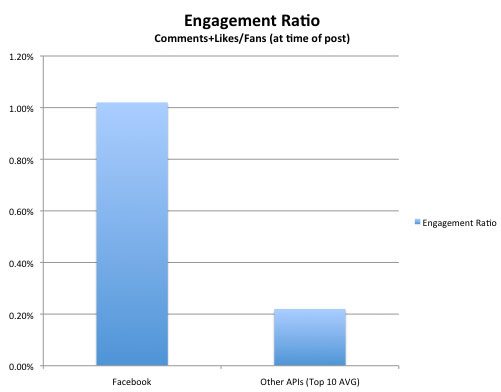There’s a rumor circling around that Facebook discriminates against the use of friendly content management apps like HootSuite, SproutSocial and TweetDeck.
These tools give community managers and social engagement pros the ability to leap tall buildings in single bounds while saving babies from packs of rabid dogs in the snow up hill both ways, so needless to say there’s a lot at stake here.
Applum, the creators of the app Edgerank Checker, decided to get to the bottom of the gossip.
Social media mavens beware: you may not like what you see.
According to the study, posting with one of the top ten third-party APIs resulted in an average of 88% fewer comments and likes, compared to posting directly on the Facebook platform.
There are two explanations for this phenomenon. First, Facebook generates users’ news feeds using “a complex algorithm” that condenses updates from certain third-party apps into a single News Feed story. This decreases the number of times people will see your content, thus lowering both impression and engagement levels.
Another explanation for the low response to third party APIs is the type and timing of content. Updates from these platforms are often scheduled or automated, and at times they come across as just that. Whether the timing is off or your links are not optimized for Facebook viewing, users can sense when your updates are robotic and they will respond by, well, not responding.
Mashable recently published a statement from Facebook with regards to content management tools:
“We’re focused on ensuring that users see the highest quality story in the News Feed. As part of this, related stories are typically aggregated to users can see a consolidated view of stories from one app.”
Third party APIs are meant to make social media more manageable for companies and consumers – but is it worth risking nearly a 90% decrease in engagement levels? There is nothing to be done about Facebook’s News Feed algorithms, but there is hope for the other part of the equation. Yes, scheduled updates make life easier, but make an effort to make them sound fresh and timely. If you are going to post a link, don’t throw it through a system that Facebook will spit back out. Fighting the anti-API battle is about knowing when an automated update works, and when it doesn’t.
We’re interested in any additional data you might have to share. Have you seen reduced engagement numbers when using third party applications to update your Facebook status? Have you taken steps to counteract Facebook’s discriminatory algorithm?
